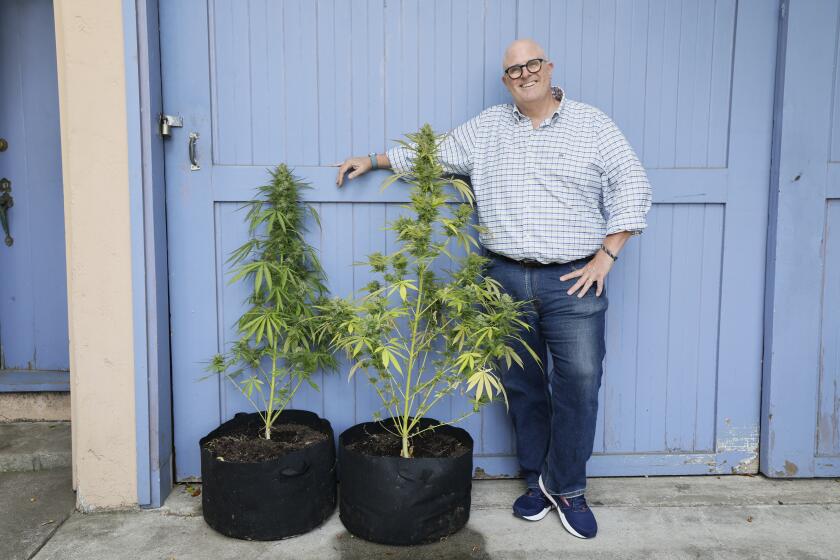Seeing Green : A new label will identify produce deemed organic by the trade watchdog group California Certified Organic Farmers.
Having just gotten back from a few weeks on a farm in France, I found something waiting for me that I had been used to seeing over there.
Ken Creason, a Piru citrus grower, sent me something that may look like a humble orange crate label to most folks. It reminded me of an Appellation d’Origine Controlee-- the coveted wine label that French vintners fear losing if they fail to pass regular inspections.
The local label, which in full identifies the produce as “Desirable Brand: Grown & Packed By Piru Citrus Assn. Piru, Calif. Ventura Co.,” will be used only on produce deemed organic by the trade watchdog group California Certified Organic Farmers. Creason is president of the Fillmore-Piru Citrus Assn., which he says is “the largest biologically controlled citrus operation in the world.”
“We could have gone and called ourselves organic already,” said Creason. “But we don’t want to mess up a good thing. We’re proud of what we’re doing and want to get certification for it.”
Creason is referring to a rigorous scientific investigation that CCOF’s man in Ventura County, Marshall Chrostowsky, and his inspectors conduct over a span of years. Yes, years. Soil has to be free of chemicals before CCOF awards its appelation.
For Creason’s group, the green light should come at Christmas, and if it is thorough going in its non-chemical ways, “Desirable Brand” citrus will reach the market.
The Roper Organization and a recent New York Times poll indicate more than 80% of consumers consider themselves “environmentalists.” However, only 10% actually let this view influence their buying patterns. But that seems to be a big enough market segment for Creason and his growers. “These guys,” he said, “want to do it.” Go organic, that is. And they expect to get premium prices.
This local eco-labeling story is part of a state program spurred by CCOF--the biggest organic certifier in the United States. Last year, the California Assembly passed legislation providing for an unusual public-private certification system for organic produce.
Initially, big growers fought it, but then they did some number crunching and decided that a statewide labeling system with a real degree of legitimacy would be good for business. The state Department of Food and Agriculture installed Paul Branum, a tough-minded veteran inspector from the Department of Weights and Measures as the manager of the California Organic Foods Program.
Passed without sufficient funding, the bill, AB 2012, is being buttressed with a “cleanup bill,” AB 645, which Branum says is “flying” through the Senate. It was already passed by the Assembly, this time with big-grower support.
Next year, Branum and his advisers (drawn from government and industry) will get applications from private, nonprofit groups who want to be contract inspectors. Branum will delve into the track records of these organizations, then conduct periodic reviews, becoming the cop that keeps the guys on the beat clean.
Those who pass muster will conduct the certification inspections on organic farms around the state. Farmers will pay for these inspections. As the program gets up and running, growers will be authorized to use the designation “Certified Organically Grown.” This is already being used by CCOF, and it is widely accepted. Indeed, the state program is based on CCOF standards.
Thus, when Creason growers get their CCOF certification late this year, they will probably be positioned to have it acknowledged at the state level when Branum’s program kicks in.
All this is being watched with interest at the federal level. The U.S. Senate is holding hearings on a national standard for organically grown food--focusing on the problem of credible verification.
Last week, two national organizations, Green Cross and Green Seal, announced programs for certification of various consumer goods as “environmental.” While these groups are fighting it out in the press as to who is greener than who and what the national environmental standard should be, California is plowing along with its philosophy of Just Do It.
Referring to our forthcoming state program, Michael Jacobson, director of the Washington-based Center of Science in the Public Interest, told me on the phone, “Having an organic standard like yours mitigates the need for these organizations.”
And last Sunday’s New York Times reported that the governor of a big Eastern state, when researching how to control the environmental impact of consumer products “looks to California.”
Creason and his growers should be proud because the governor in question presides over the “other” citrus state--Florida.
I have for some time had the pleasant premonition that Ventura County produce, both fruits and vegetables, will eventually be recognized and labeled as outstanding.
Creason’s label is evidence that is happening. But now I have a new premonition: that someday there will be counterfeit printings of our Ventura Appelation d’Origine Controlee appearing on boxes of produce from who knows where.
We’ll have to call Branum and his Eco-Mounties to set things right.
* FYI
For information on the organic produce standards of the California Organic Farmers, call (403) 423-2263. For information on the new state organic produce program, call Paul Branum, manager of the California Organic Foods Program, state Department of Food and Agriculture (916) 323-7597.
More to Read
Eat your way across L.A.
Get our weekly Tasting Notes newsletter for reviews, news and more.
You may occasionally receive promotional content from the Los Angeles Times.










